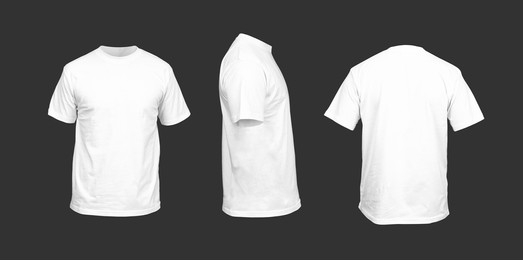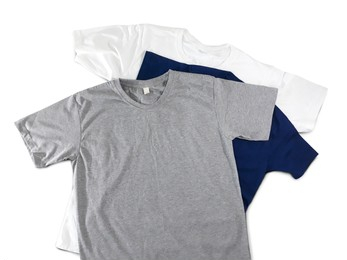Are you planning to buy or sell t-shirts in bulk and wondering how much they weigh? Or are you just curious about the weight of a typical T-shirt? Either way, this article has got you covered.
In this article, I will explore the factors that influence the weight of a t-shirt and give you a clear idea of how much a t-shirt weighs.
Average Weight of a T-Shirt
The average weight of a t-shirt is around 150-200 grams or 5-7 ounces. This weight is for a standard, adult-sized t-shirt made of 100% cotton.
However, as mentioned earlier, the weight of a t-shirt can vary depending on several factors.
Weight of Different Types of T-Shirts
Cotton T-Shirts

Cotton t-shirts are the most common type of t-shirt, and they come in different weights.
A standard, adult-sized cotton t-shirt can weigh between 140-200 grams or 5-7 ounces. However, heavy-weight cotton t-shirts can weigh up to 250 grams or 8.8 ounces.
Related: Things That Weigh 500 Grams
Polyester T-Shirts

Polyester t-shirts are lightweight and often used in sports and athletic wear. A standard, adult-sized polyester t-shirt can weigh between 120-170 grams or 4.2-6 ounces.
However, high-performance polyester t-shirts can weigh as little as 70 grams or 2.5 ounces.
Blended T-Shirts

Blended t-shirts are made from a mix of cotton and polyester or other fabrics. The weight of a blended t-shirt will depend on the percentage of each fabric used.
For instance, a cotton/polyester blend t-shirt can weigh between 140-200 grams or 5-7 ounces.
How to Measure the Weight of a T-Shirt

Measuring the weight of a t-shirt is a simple process that can be done using a digital scale.
Here are the steps you can follow to measure the weight of a t-shirt:
Choose a digital scale: You’ll need a digital scale that can measure in grams or ounces. Make sure the scale is calibrated and functioning correctly.
Place the t-shirt on the scale: Place the t-shirt on the scale while it’s flat and not folded or rolled up. Make sure the t-shirt is centered on the scale.
Record the weight: Once the t-shirt is on the scale, record the weight. Make sure to note whether the scale is measuring in grams or ounces.
Related: Japanese Shirt Size Chart & Comparison To US Shirt Size
Subtract the weight of the packaging: If you’re shipping t-shirts, it’s important to remember to subtract the weight of the packaging material (such as a poly bag or box) from the total weight of the package.
Factors That Affect the Weight of a T-Shirt
The weight of a t-shirt is influenced by various factors, including:
- Fabric type: Different fabrics have different weights. For instance, a cotton t-shirt will weigh differently from a polyester t-shirt.
- Fabric quality: Higher-quality fabrics tend to be heavier than lower-quality fabrics.
- Fabric blend: A blended fabric t-shirt will have a different weight than a pure cotton or polyester t-shirt.
- Size: Larger T-shirts will generally weigh more than smaller T-shirts.
- Design: The design of a t-shirt, such as the number of colors and graphics, can affect its weight.
Best Way to Ship A T-Shirt
When it comes to shipping t-shirts, there are a few best practices to ensure that they arrive at their destination in good condition. Here are some tips for shipping t-shirts:
Choose the right packaging: Use a packaging material that is sturdy enough to protect the t-shirt during transit. A padded envelope or a small box is a good option.
Protect the t-shirt: To prevent the t-shirt from getting damaged or wrinkled during shipping, fold it neatly and place it in a plastic bag. This will also protect the t-shirt from any moisture or water damage that may occur during transit.
Seal the packaging securely: Use packing tape to seal the packaging securely, making sure that all edges and seams are sealed. This will prevent the t-shirt from falling out or getting damaged during transit.
Label the package clearly: Clearly label the package with the recipient’s name and address, as well as your own return address. This will ensure that the package reaches the intended recipient.
Consider shipping insurance: If you’re shipping valuable or one-of-a-kind t-shirts, consider purchasing shipping insurance to protect them in case of loss or damage during transit.
By following these tips, you can ensure that your t-shirts arrive at their destination in good condition.
FAQs
How much does a T-shirt weigh in kg?
The weight of a T-shirt can vary depending on its size, fabric type, and design. On average, a T-shirt can weigh anywhere from 100 to 300 grams. This translates to 0.1 to 0.3 kilograms.
What is the weight of a T-shirt?
As mentioned earlier, the weight of a T-shirt can vary depending on several factors, including its fabric type, size, and design. A plain cotton T-shirt in size medium typically weighs around 150 to 200 grams.
How much does a T-shirt weigh for shipping?
The weight of a T-shirt for shipping can vary depending on the weight of the packaging material used. On average, the weight of a T-shirt in a padded envelope or small box with packaging material can be around 200 to 350 grams.
How many shirts are in 1kg?
The number of shirts in 1kg can vary depending on their size, fabric type, and design. On average, you can expect to fit around 5 to 10 T-shirts in 1kg.
How much does a plain T-shirt weigh?
A plain T-shirt can weigh anywhere from 100 to 300 grams, depending on its size, fabric type, and design. A plain cotton T-shirt in size medium typically weighs around 150 to 200 grams.